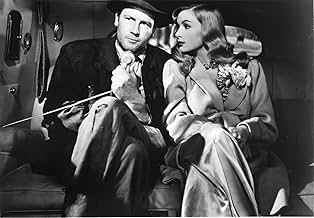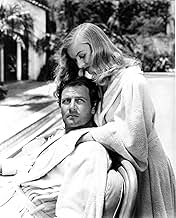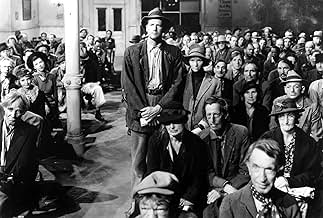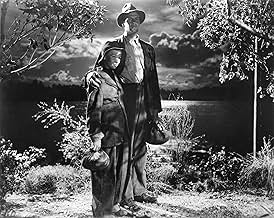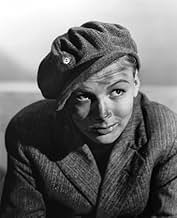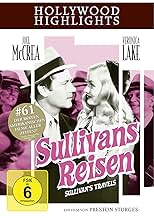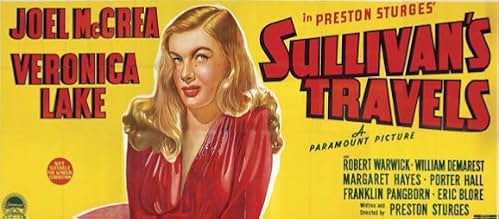Hollywood director John L. Sullivan sets out to experience life as a homeless person in order to gain relevant life experience for his next movie.Hollywood director John L. Sullivan sets out to experience life as a homeless person in order to gain relevant life experience for his next movie.Hollywood director John L. Sullivan sets out to experience life as a homeless person in order to gain relevant life experience for his next movie.
- Awards
- 2 wins total
Charles R. Moore
- Colored Chef
- (as Charles Moore)
- Director
- Writer
- All cast & crew
- Production, box office & more at IMDbPro
Featured reviews
In Hollywood, the spoiled director of humdrum movies, John Lloyd Sullivan (Joel McCrea), was born in silver spoon but is very successful with his superficial comedies. Out of the blue, he tells to his producer Mr. LeBrand (Robert Warwick) that he wants to make serious dramas, like "O Brother, Where Art Thou?" and he will live like a tramp on the streets to learn the sorrows of great part of the population. He wears cheap clothes and tries to blend with poor people but he always returns to Hollywood protected by the safety team hired by the studio.
One day, he goes to a dinner with a coin and a blonde girl (Veronica Lake) offers bacon and eggs to him. Soon he learns that the girl is a failed actress that had never a chance in Hollywood and is returning home hitchhiking without any money. Sullivan decides to retribute her kindness giving a ride to her in his car but they are arrested by the police. When they are released, the girl decides to join Sullivan in his quest to learn about poverty. When Sullivan is satisfied, he is robbed and dumped unconscious in a train. He awakes in the countryside where there is an incident and he is arrested and sentenced to a labor camp, where he leans the importance of comedy in the miserable lives of destitute people.
"Sullivan's Travels" is a delightful movie by Preston Sturges with a satire of Hollywood lifestyle and the importance of comedy in the life of people, a relief for a couple of minutes for those that do not have other sort of entertainment. Joel McCrea is very funny in the role of a naive director trying to find how the poor people live. His chemistry with the gorgeous Veronika Lake is perfect and this was the first time that I noted that this lovely actress was only 1.51 m height. My vote is eight.
Title (Brazil): "Contrastes Humanos" ("Human Contrasts")
One day, he goes to a dinner with a coin and a blonde girl (Veronica Lake) offers bacon and eggs to him. Soon he learns that the girl is a failed actress that had never a chance in Hollywood and is returning home hitchhiking without any money. Sullivan decides to retribute her kindness giving a ride to her in his car but they are arrested by the police. When they are released, the girl decides to join Sullivan in his quest to learn about poverty. When Sullivan is satisfied, he is robbed and dumped unconscious in a train. He awakes in the countryside where there is an incident and he is arrested and sentenced to a labor camp, where he leans the importance of comedy in the miserable lives of destitute people.
"Sullivan's Travels" is a delightful movie by Preston Sturges with a satire of Hollywood lifestyle and the importance of comedy in the life of people, a relief for a couple of minutes for those that do not have other sort of entertainment. Joel McCrea is very funny in the role of a naive director trying to find how the poor people live. His chemistry with the gorgeous Veronika Lake is perfect and this was the first time that I noted that this lovely actress was only 1.51 m height. My vote is eight.
Title (Brazil): "Contrastes Humanos" ("Human Contrasts")
After the opening credits, the film opens with the following statement.
"To the memory of those who made us laugh: the motley mountebanks, the clowns, the buffoons, in all times and in all nations whose efforts have lightened our burden a little, this picture is affectionately dedicated."
With this film, Preston Sturges made one of the smartest and most insightful comedies ever to come out of Hollywood, in which he especially held up the mirror to Tinseltown itself. A Hollywood variation on Gulliver's Travels, it's the tale of Hollywood director John Sullivan (Joel McCrea), tired of making Hollywood Fluff, who wants to branch out with a socially conscious epic, called "O Brother, Where Art Thou", and sets out to research the meaning of poverty. His studio bosses (very funny roles by Robert Warwick and Porter Hall) try to tell him it's a ridiculous idea but Sullivan insists, puts on some hobo clothes and sets out to see what it's like to experience poverty and suffering. The studio soon sees it as potential publicity stunt and sent an entire crew to follow him around during his trip.
Some very enjoyable references to socially conscious movie-making, to Ernst Lubitch in particular, make this particularly fun with some knowledge of the period and the films mentioned, albeit not necessary. And almost worth seeing alone for Veronica Lake's memorable performance as a failed starlet.
According to Sturges, the film did contain a little "message":
"SULLIVAN'S TRAVELS is the result of an urge, an urge to tell some of my fellow filmwrights that they were getting a little too deep-dish and to leave the preaching to the preachers."
By any means, he made a uniquely self-reflective comedy about Hollywood with wonderful characterizations and superlative performances. A brilliant satire with a "message" just as poignant as ever.
Camera Obscura --- 9/10
"To the memory of those who made us laugh: the motley mountebanks, the clowns, the buffoons, in all times and in all nations whose efforts have lightened our burden a little, this picture is affectionately dedicated."
With this film, Preston Sturges made one of the smartest and most insightful comedies ever to come out of Hollywood, in which he especially held up the mirror to Tinseltown itself. A Hollywood variation on Gulliver's Travels, it's the tale of Hollywood director John Sullivan (Joel McCrea), tired of making Hollywood Fluff, who wants to branch out with a socially conscious epic, called "O Brother, Where Art Thou", and sets out to research the meaning of poverty. His studio bosses (very funny roles by Robert Warwick and Porter Hall) try to tell him it's a ridiculous idea but Sullivan insists, puts on some hobo clothes and sets out to see what it's like to experience poverty and suffering. The studio soon sees it as potential publicity stunt and sent an entire crew to follow him around during his trip.
Some very enjoyable references to socially conscious movie-making, to Ernst Lubitch in particular, make this particularly fun with some knowledge of the period and the films mentioned, albeit not necessary. And almost worth seeing alone for Veronica Lake's memorable performance as a failed starlet.
According to Sturges, the film did contain a little "message":
"SULLIVAN'S TRAVELS is the result of an urge, an urge to tell some of my fellow filmwrights that they were getting a little too deep-dish and to leave the preaching to the preachers."
By any means, he made a uniquely self-reflective comedy about Hollywood with wonderful characterizations and superlative performances. A brilliant satire with a "message" just as poignant as ever.
Camera Obscura --- 9/10
Preston Sturges (1898-1959) wrote over 40 film screenplays spanning the years 1930-1958 and directed over a dozen films 1940-1955. His first attempt at directing was a success with a string of two popularly and critically acclaimed films in each of the years 1940 and 1941, "The Great McGinty", "Christmas in July"; "The Lady Eve" (starring Henry Fonda and Barbara Stanwyck), and this film, "Sullivan's Travels".
The beauty of "Sullivan's Travels" is the combination in genre of comedy as well as social satire and realism of the tough times of the Great Depression that the country had just weathered for a decade. Throw a romance in to the mix and a level of redirection of a "film on film" to make this an interesting film.
John Sullivan (Joel McCrea) is a famous director who is at odds with his production company. They want him to direct a comic film, while he wants to apply his talent to creating an analytic looking glass onto the sobering times called, "O Brother, Where Art Thou?". Wealthy and successful, he is mocked for not at all knowing misfortune - how would he make such a film? John takes this as a challenge, dresses as a hobo, and leaves the studio with a dime in his pocket to explore what life is like for the down and out.
However he tries to flee, he ends up getting somehow quickly being returned to Hollywood. Early on, he meets "the girl" (Veronica Lake; I don't recall her ever being given a name in the film) who sees that he is too innocent to survive on his own, and insists on bringing her broader knowledge of society to the journey and joining him to get him through this learning adventure.
The first part of the film is comic, but just as it seems to be coming to an unfulfilled ending, something unexpected happens. This event alters the course of everything and exposes John to some of the true injustices of the time - and shows him (and poignantly reminded me) that comedy is particularly important when some people have nothing else to cheer them up.
This is a film of classic Hollywood vintage, with good, snappy performances by both of the lead actors. The romance isn't at all developed but just seems to happen in a matter-of-fact way (perhaps we can take it on faith that there is instant chemistry), but what is lacking in psychology of the relationship is made up for in the chilling glimpse we get of the psyche of the underdog in Depression America.
--Dilip Barman June 19, 2004
The beauty of "Sullivan's Travels" is the combination in genre of comedy as well as social satire and realism of the tough times of the Great Depression that the country had just weathered for a decade. Throw a romance in to the mix and a level of redirection of a "film on film" to make this an interesting film.
John Sullivan (Joel McCrea) is a famous director who is at odds with his production company. They want him to direct a comic film, while he wants to apply his talent to creating an analytic looking glass onto the sobering times called, "O Brother, Where Art Thou?". Wealthy and successful, he is mocked for not at all knowing misfortune - how would he make such a film? John takes this as a challenge, dresses as a hobo, and leaves the studio with a dime in his pocket to explore what life is like for the down and out.
However he tries to flee, he ends up getting somehow quickly being returned to Hollywood. Early on, he meets "the girl" (Veronica Lake; I don't recall her ever being given a name in the film) who sees that he is too innocent to survive on his own, and insists on bringing her broader knowledge of society to the journey and joining him to get him through this learning adventure.
The first part of the film is comic, but just as it seems to be coming to an unfulfilled ending, something unexpected happens. This event alters the course of everything and exposes John to some of the true injustices of the time - and shows him (and poignantly reminded me) that comedy is particularly important when some people have nothing else to cheer them up.
This is a film of classic Hollywood vintage, with good, snappy performances by both of the lead actors. The romance isn't at all developed but just seems to happen in a matter-of-fact way (perhaps we can take it on faith that there is instant chemistry), but what is lacking in psychology of the relationship is made up for in the chilling glimpse we get of the psyche of the underdog in Depression America.
--Dilip Barman June 19, 2004
As a TV Producer of "entertainment" shows, I make a point of watching this film at least once a year and giving DVDs of it to all who may disparage what I do.
Preston Sturges achieves the impossible in this movie: he has his cake and eats it too. He makes a perfect film - he manages to make a socially significant statement while wrapping it up in a comedy confection.
His hero, John L. Sullivan (Joel McCrea - a very underestimated actor) is a
succcessful director of frivolous musicals and comedies who, one day, decides he needs to make a Capra-esque "serious"film. His studio chiefs and immediate staff are against it and point out that he is rich and privileged, what does he know about the less fortunate? Sullivan retorts with an ingenious plan:
Sullivan: "You're perfectly right...but I'll tell you what I'm going to do first: I'm going to get some old clothes and some old shoes from wardrobe and start out with ten cents in my pocket...and I'm not coming back till I know what trouble it..I'm going out on the road to find out what it's like to be poor and needy and then I'm going to make a picture about it."
Burrows(his butler): If you'll permit me to say so, sir, the subject is not an interesting one. The poor know all about poverty and only the morbid rich would find the topic glamorous.
Nevertheless, Sullivan does it and unwittingly (and hilariously) discovers the true value comedy has in the lives of those with little else to laugh about...
It's genius. Exquisitely written, directed and acted (Sturges uses his usual ensemble plus the ever watchable Veronica Lake, even here in her most improbable disguises [I met her, professionally, in England in the 70s, she was still a class act and her "rider" demanded her drink of choice - vodka and cranberry juice).
Sullivan's Travels is a true gem of American Cinema. Ten out of ten.
Preston Sturges achieves the impossible in this movie: he has his cake and eats it too. He makes a perfect film - he manages to make a socially significant statement while wrapping it up in a comedy confection.
His hero, John L. Sullivan (Joel McCrea - a very underestimated actor) is a
succcessful director of frivolous musicals and comedies who, one day, decides he needs to make a Capra-esque "serious"film. His studio chiefs and immediate staff are against it and point out that he is rich and privileged, what does he know about the less fortunate? Sullivan retorts with an ingenious plan:
Sullivan: "You're perfectly right...but I'll tell you what I'm going to do first: I'm going to get some old clothes and some old shoes from wardrobe and start out with ten cents in my pocket...and I'm not coming back till I know what trouble it..I'm going out on the road to find out what it's like to be poor and needy and then I'm going to make a picture about it."
Burrows(his butler): If you'll permit me to say so, sir, the subject is not an interesting one. The poor know all about poverty and only the morbid rich would find the topic glamorous.
Nevertheless, Sullivan does it and unwittingly (and hilariously) discovers the true value comedy has in the lives of those with little else to laugh about...
It's genius. Exquisitely written, directed and acted (Sturges uses his usual ensemble plus the ever watchable Veronica Lake, even here in her most improbable disguises [I met her, professionally, in England in the 70s, she was still a class act and her "rider" demanded her drink of choice - vodka and cranberry juice).
Sullivan's Travels is a true gem of American Cinema. Ten out of ten.
As original a piece from the 1940s as you'll likely come across and one where it could quite easily have found itself as knotted and gnarled as some of the boots seen pounding the highways and byways of its cast. Fortunately those pretentious rips fail to appear and it's the arrival of Veronica Lake that turns the ramble to a journey and an illustration as relevant today about the lack of opportunity we continually chose to turn a blind eye to. An interesting twist towards the end provides something to chew on and supports a finale that may well give you a little to smile about, maybe even a chuckle.
Storyline
Did you know
- TriviaCinematographer John Seitz admired Preston Sturges' unconventional approach to his work. The opening scene comprised ten pages of dialogue to cover about four and a half minutes of screen time. It was scheduled for two complete days of shooting. On the morning of the first day, Seitz found Sturges inspecting the set with a viewfinder, looking for where he could cut the scene and change camera set-ups. Seitz dared him to do it all in one take. Never one to refuse a dare, Sturges took him up on it, although the nervous Seitz had never attempted to complete a two-day work schedule in one day. With the endorsement of McCrea and the rest of the actors, Sturges pressed on, determined to set a record. The first take was fine, but the camera wobbled a little in the tracking shot following the men from screening room to office, so they tried again. They did two or three takes at the most and that was it - two full days work by 11 a.m. on the first day, a feat that had the entire studio buzzing.
- GoofsWhen Sullivan and the Girl jump off the train and walk to the lunch stand, nothing is visible around the outside of the lunch stand--not a car, tree or anything. When Sullivan asks if the proprietor had seen a land yacht (a big RV), the proprietor points to the side and they look out the window and see the big land yacht parked there. Of course, if it had been there in the first place, Sullivan would have seen it right away and not gone into the lunch stand.
- Quotes
[last lines]
John L. Sullivan: There's a lot to be said for making people laugh. Did you know that that's all some people have? It isn't much, but it's better than nothing in this cockeyed caravan.
- Crazy creditsThe Paramount logo appears as a seal on a package.
The package is opened to reveal a book with the film title on it and the opening credits appear on pages in the book.
- ConnectionsFeatured in The Cinematographer (1951)
- SoundtracksSpring Song
(1844) (uncredited)
Written by Felix Mendelssohn
Played as part of the score when Sullivan starts his experiment
Reprised when he starts a second time
Details
Box office
- Budget
- $689,665 (estimated)
- Gross worldwide
- $10,272
- Runtime1 hour 30 minutes
- Color
- Aspect ratio
- 1.37 : 1
Contribute to this page
Suggest an edit or add missing content



